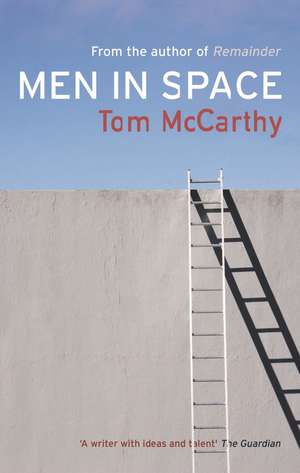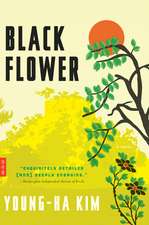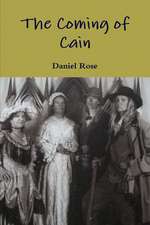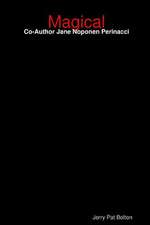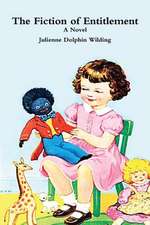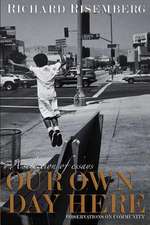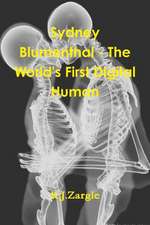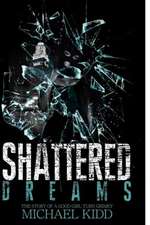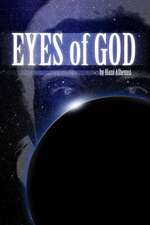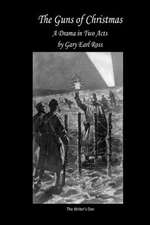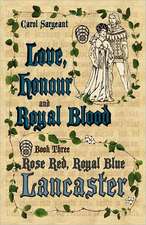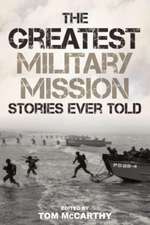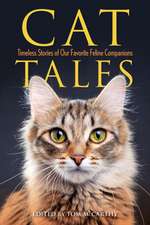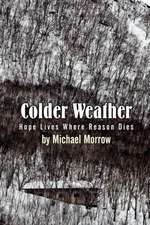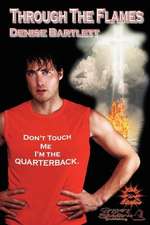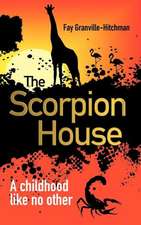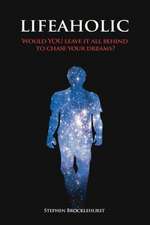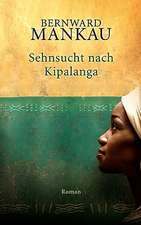Men In Space
Autor Tom McCarthyen Limba Engleză Paperback – 12 mai 2008
| Toate formatele și edițiile | Preț | Express |
|---|---|---|
| Paperback (2) | 58.05 lei 3-5 săpt. | +11.50 lei 7-13 zile |
| Alma Books COMMIS – 12 mai 2008 | 58.05 lei 3-5 săpt. | +11.50 lei 7-13 zile |
| VINTAGE BOOKS – 31 ian 2012 | 106.45 lei 3-5 săpt. |
Preț: 58.05 lei
Nou
Puncte Express: 87
Preț estimativ în valută:
11.11€ • 11.64$ • 9.18£
11.11€ • 11.64$ • 9.18£
Carte disponibilă
Livrare economică 22 martie-05 aprilie
Livrare express 08-14 martie pentru 21.49 lei
Preluare comenzi: 021 569.72.76
Specificații
ISBN-13: 9781846880568
ISBN-10: 1846880564
Pagini: 288
Dimensiuni: 128 x 198 x 21 mm
Greutate: 0.28 kg
Editura: Alma Books COMMIS
Colecția Alma Books
Locul publicării:United Kingdom
ISBN-10: 1846880564
Pagini: 288
Dimensiuni: 128 x 198 x 21 mm
Greutate: 0.28 kg
Editura: Alma Books COMMIS
Colecția Alma Books
Locul publicării:United Kingdom
Notă biografică
Known in the art world for the reports, manifestos and media interventions he has made as General Secretary of the International Necronautical Society (INS), a semi-fictitious avant-garde network, Tom McCarthy is the author of four novels: Remainder, Men in Space, C and Satin Island. The last two were shortlisted for the Man Booker Prize. In 2013 he was awarded the inaugural Windham Campbell Prize for Fiction.
Recenzii
McCarthy has perversely managed to make fiction that feels exuberantly fresh and alive.
McCarthy writes with devastating charm and lucidity - there's scarcely a loose sentence in the book.
A confident and intelligent meditation on failed flights of transcendence.
In Tom McCarthy, English fiction has a new laureate of disappointment.
Men in Space is a compelling and imaginative philosophical novel; McCarthy describes a world in which we are only occasionally party to brief, frightening intimations of greater forces at work, like the mysterious half-tuned transmissions at the ends of a radio dial.
A master craftsman who is steering the contemporary novel towards exciting territories.
McCarthy writes with devastating charm and lucidity - there's scarcely a loose sentence in the book.
A confident and intelligent meditation on failed flights of transcendence.
In Tom McCarthy, English fiction has a new laureate of disappointment.
Men in Space is a compelling and imaginative philosophical novel; McCarthy describes a world in which we are only occasionally party to brief, frightening intimations of greater forces at work, like the mysterious half-tuned transmissions at the ends of a radio dial.
A master craftsman who is steering the contemporary novel towards exciting territories.
Extras
Here’s Anton Markov, sitting at a table, running his finger round a saucer’s rim as he watches his compatriot Koulin stride across the Malostranská Kavárna’s floor. Koulin takes bouncy, elastic steps. He swings his arms and hips round chairs and tables. He turns like an ice skater to glide backwards for two paces as he skirts around the waitress, a girl of twenty-odd. Wall-mounted mirrors, one on either side of the door from which he’s just emerged, the door that leads off to the toilets, render the event in triplicate: three Koulins – front, left profile and right profile, like in police mugshots. There are three waitresses too, three sets of background customers. Looking at the multiplying scene, Anton recalls his refereeing days in Bulgaria: the trick was to see all the near-identical shirts, repeated runs, sudden departures, switches and loop-backs as one single movement, parts of a modulating system which you had to watch as though from outside, or above, or somewhere else.
“So anyway,” says Koulin, sliding back into his chair and stretching his arm out across the radiator behind him, “this Yugoslavian’s place is in Prague Four, by Nusle. He lives on the fourth floor. Me and Milachkov thought we’d scare him by saying we’d throw him out of the window. So we turn up there and it’s him that opens the door to us, in a towel-robe. It must be about 10 a.m. Mila knocks him straight down and we pick him up, one of us at either end, and carry him towards the window. But while we’re lugging him there, this girl walks in out of the bedroom. And guess what?”
His eyes beam across the table, pink-flushed with excitement.
“What?” asks Anton.
“She’s naked,” Koulin tells him. “Really lovely body. Brown hair down her back. Small round tits. When she sees us she starts crying and screaming Oh don’t hurt him! Please don’t hurt him! I start to explain that we don’t want to hurt him but he owes Ili money for the cigarettes he’s selling on his patch, but she just cries and screams some more. The Yugoslavian’s all calm because he’s dazed from Mila’s punch, so he’s no problem, but this girl is kicking up a storm. And then...” He shifts his arm. “This bit is kind of difficult to explain exactly as it happened... Well, she pissed herself. But what I noticed is a kind of dribble – no, I lie, it wasn’t a dribble: it was more like a bag had burst just on the inside of her leg. A bag that wasn’t there before. Or like when someone throws a water balloon, you know, and it explodes. One solid mass. At least, it was solid till it hit the floor, one of those criss-cross floors, all wood, what do they call them?...”
“Parquet. Parquetry.”
“Right: till it hit the parquetry. Then it broke. Really bizarre. Because she was naked there was nothing to interrupt its fall. And this girl, this beautiful naked girl just stood above it, screaming. I don’t know if she’d even noticed what she’d just done...”
Did Koulin tell a similar story about Anton, their first meeting? Did he slide into a similar chair – perhaps this very one – and, stretching his arm across the radiator, say to his friend Milachkov: So there’s me and Janachkov, and Jana’s itching to break this guy’s finger, got his finger in his hand, this short, smart-ass guy, maybe Jewish with the face he has. And Ili’s there too, and he starts explaining to the guy what he’s done wrong, importing all that pop and selling it bang in the middle of Prague without going through us, or anyone else for that matter... And behind the casual anecdote, Anton pinned against the wall rigid with fear, wishing he’d never noticed in the first place that Prague’s potraviny had been out of lemonade all summer, never suggested Zdeněk drive to Germany to get some, hoping Helena wouldn’t come home just then, hoping they’d just break his finger and leave it at that, not punch him in the stomach or the face, or at least not the balls, please not the balls – when suddenly he heard Ilievski speak to Janachkov in Bulgarian. Don’t break it just yet, he told him. Anton whined You’re Bulgarian! And Janachkov immediately let the finger go.
“What the...”
Ilievski here, speaking for all of them while they stood back and stared. It was as though shared nationality had embarrassed them out of hurting him. From then on it became like an engineering faculty dinner or one of those BFA post-match receptions. Ilievski asked him how he’d come to live in Prague, what he did beside (chuckling now) selling lemonade on other people’s patches without paying dues, what he’d done back in Bulgaria... They discovered that they’d both grown up in Dragalevtsi, and that Ili had had a considerable amount of money riding on the ’87 grudge match between Levski and CSKA, money which had doubled after Anton awarded a contentious penalty to CSKA in extra time.
“How much did you pay for the pop?”
“Ten Deutschmarks per crate.”
“Not bad at all. How would you like to work for me? I can offer...”
Anton accepted on the spot. That evening he went to the Bulgarian church on Ječná and lit a candle for whatever guardian angel – or neural impulse – had made him blow for handball four years earlier.
“...and then this second girl walks in,” Koulin’s saying, “though she’s not naked, more’s the pity. She tries to calm the first girl down. The parquetry’s not varnished, so the piss has made a big dark patch across it...”
Anton, still orbiting the saucer with his finger, pictures the patch, its jagged edges, the frightened girl above it. In his mind he pauses the scene, steps in, tells the girl It’s OK, just keep calm, things work themselves out, then, standing among them, regulates the other figures’ movement around the room: sends her friend to fetch a knee-length jumper for her, holds Koulin and Milachkov at bay beside the window while the Yugoslavian comes round, digs out some money, pays them... It works: the story ends without anyone else getting hurt. When he’s finished telling it, Koulin slides an envelope across the table to him.
“Passports?”
“Passports.”
Anton slips the envelope into a dossier he’s got with him. Ilievski, Koulin says, will be at the car market by Palmovka at eleven thirty.
“He told you that?”
“Yeah. I was with him last night. He wants you to meet him there.”
“OK, then. Let me...”
“I got that.”
Koulin flips the bill over, sliding his thumb up so that the paper slots between his right hand’s middle and index fingers.
“You’ve practised that.”
“What?”
“Nothing. Thanks.”
Outside, the sun’s breaking through the thick December cloud that was covering the whole city as Anton made his way to the Kavárna. Roofs – red-, gold- and brown-tiled – are still icy. Anton crosses the tram tracks at the edge of Malostranská Náměstí and walks down Mostecká, past bureaux de change and shops selling Bohemian crystal. He lets his shoe-soles scrape the pavement’s alternating black and white cobbles. It’s a habit he has. Helena complains that it wears his shoes out, but he likes the noise, the sand and tap. His rhythm is broken when he passes beneath the portal onto Karlův Most: there are too many people on the bridge. It’s the usual crowd: journeyman artists hawking sketches of the Staré Město skyline, or drawing people perched on stools in front of them. Portréty, Karikatury. Solitary violinists playing Mozart, red fingers poking through the ends of cut-off gloves, frosted breath drifting off the strings. Quartets of musicians playing more Mozart. Minstrels dressed in pseudo-eighteenth-century frills and stockings singing Mozart arias a cappella. Always fucking Mozart. There’s a quick-change artist doing the three-cups-one-ball trick, a troupe of red-nosed Slovakians in national costume twanging thick pieces of string attached to rough-cut wooden blocks. There are organ grinders; dreadlocked jugglers; hair-wrappers, cross-legged on woven mats; masseurs; tarot readers; puppeteers; men with parrots and boa constrictors; women selling tacky jewellery. And tourists, endless tourists, wearing brightly coloured scarves and jackets, oozing and coagulating around maps and cameras like some dense, radioactive mass, a fluorescent toxic spill; coagulating around Anton too, hemming him in.
The bridge ends, releasing him onto the tramlines on Křižovnická. Through the thinning red and yellow coats he can see Zhelyazkov and Spasiev behind their stalls on Karlova. Zhelyazkov’s wearing a combat jacket and a Sparta scarf. Bottles of lemonade are piled up in pyramids on the stall: Anton’s lemonade. Right next to Zhelyazkov, Spasiev’s togged up in a thick fur coat. He’s got his bulkiest Soviet army hat on, ear-flaps down. In front of him sit rows of other Soviet army hats: infantry, light cavalry, armoured division, sappers. Bulk-made in Turkey. Anton’s seen a whole consignment of them in Ilievski’s garage once, Janachkov grumbling as he scuffed them with sandpaper, one by one.
“Comrade pilot,” Spasiev shouts, pulling an airman’s cap down over Anton’s head, “fly us somewhere warm!”
“Have you heard the joke about the Russian pilot and the English pilot who both crashed on the same desert island?” Anton asks him.
“Go on.”
“The English one is looking through a telescope and he sees a St Bernard dog – one of those giant dogs with tiny barrels of rum tied to their necks – swimming towards the island. So the English pilot says: ‘Hey, look! It’s man’s best friend!’ And the Russian pilot grabs the telescope and looks through it and says: ‘Yeah, and there’s a dog with it!’”
There’s a pause, then both men bend over in laughter. They stay crumpled for a while, then look up at each other and immediately crumple again, the laughter growing louder, shoulders and backs shaking as they cough and sob over the joke. Spasiev’s banging on the table. Zhelyazkov’s leaning forwards on his stall’s canopy. Eventually he straightens up, pulls a hip flask from his combat’s pocket and holds it out to Anton.
“Man’s best friend!”
“Exactly. Oh, right. No thanks.”
“Lemonade?”
“Thanks, no.”
Zhelyazkov pulls a wad of cash out of another pocket and slaps it against Anton’s chest. Spasiev opens up a metal box and does the same. Anton counts both wads, then slips them into his dossier.
“Here, I’ve got another one. This American delegation goes to Moscow to visit a factory. So the Party tell the factory chief that American delegations are always asking about anti-Semitism in the Soviet Union, so to make sure he shows them some happy Jewish workers. The chief says: ‘But there aren’t any Jewish workers here, because you made me fire them all last year.’ So they say: ‘OK then, choose a worker and we’ll give him Jewish papers and we’ll call him Comrade Rubenstein, and when the Americans come he’ll show them his papers to prove he’s Jewish and he’ll tell them that he’s treated just as well as everyone else.’ So the chief goes off and picks out Comrade, I don’t know, say Comrade Tabalov, and gives him the Jewish papers and tells him to answer to the name of Rubenstein and so on. So the American delegation comes and sure enough they ask the question about anti-Semitism in the Soviet Union, and the chief says: ‘Gentlemen, there is no anti-Semitism here. Our own Jewish comrade, Comrade Rubenstein, will tell you as much. Call Comrade Rubenstein!’ They wait, and wait some more, and some more still, and after ages the assistant chief comes back and whispers in the chief’s ear: ‘Chief! Comrade Rubenstein has emigrated to Israel!’”
This time the laughter’s forced.
“That’s Jews for you,” says Spasiev, prefacing his observation with a click of his tongue.
There’s an awkward silence. They think he’s Jewish too. He’s not: solid Orthodox. By thirteen he was bearing cups at Sveta Sofia. Uncle Stoyann would give him rosaries and Prayer Books on his birthdays. I don’t speak English, but it doesn’t matter, Stoyann told him as he met Anton for the last time before leaving on a religious visa for Philadelphia; I’ll talk vulgate Latin with the other priests. That’s one language even you don’t speak! Each time he steps into an Orthodox church, even here in Prague, the smell of incense and the dull chanting from the seats behind the altar usher him back into his childhood and, at the same time, summon up the tall buildings, gushing steam and stilted metros of Uncle Stoyann’s new home that he hasn’t made it to, not yet.
He’ll go up to the automat at Mústek, make a pick-up from Janachkov, then hop on the yellow line. Pleasantries first. To Zhelyazkov:
“The pop not selling so well?”
“Too cold.”
“You should sell coffee. Hot wine.”
“Tell Ilievski to sort it out with Saudek.”
“Saudek?”
“Runs the next patch.” Zhelyazkov jerks his thumb towards the stall five metres away. Steam is piping out of two large samovars. A board in front reads: Káva, Čaj, Svařené Víno. “Little Bulgaria ends here. It’s Czechs from here on up to Husova. They made Ili agree we won’t sell hot stuff.”
“Well, that’s capitalism. You’ll clean up come spring. I’ve got to go.”
At the top of Karlova Anton glances into the window of the Prague House of Photography and sees a girl sitting at a desk. On a wall hook behind her hangs a leopard-skin, or possibly fake-leopard-skin, jacket. She catches his eye, smiles. Does he know her? Shy, he presses on, crosses Staroměstské Náměstí and walks up Melantrichova. The sky’s blue now, with small clouds hovering round its edges to the northwest, over Letná. Anton enters the Korunní Automat, sails past the roast-chicken counter and makes for the cake-and-coffee section. There they are, camped out around tables: money changers. Czechs and Poles, Algerians and Moroccans, Russians, Turks. Shouting figures and exchange rates to each other; laughing, arguing, jostling; shunting their clients from one table to the next; swapping cigarettes and calculators; re-exchanging money back among themselves between transactions; hopping from one language to another, to a third, a fourth – as though words, too, had negotiable value. Anton picks out Janachkov, who’s hitting hard on two North Africans, shoving a napkin with some kind of algorithm written on it in their faces: wants them to buy zlotys. He sees Anton, breaks off his negotiations, reaches into his trouser pocket, takes out a wad of five-hundred-crown notes and hands it to him.
“Vodka?”
“No. Thanks. How much have you got there?”
“Ten thousand. Coffee, then?”
Janachkov’s always gone out of his way to be nice to Anton since the finger incident. He lends him porno videos, Bruce Lee films. Anton hasn’t told him that he doesn’t have a video, and wouldn’t watch porn or karate if he did.
“I’m late for meeting Ili. Got to rush.”
He’s carrying quite a loaded dossier now: there must be fifteen thousand crowns in it. Although there are free seats, he stands in the metro carriage, clutching it to his chest. Fifteen thousand crowns, plus – what, ten, twelve passports? Wouldn’t want to get picked up right now. He never has been, not in Prague. He was interviewed by the police back home, when he applied for permission to go to America. Visiting relatives? Shouldn’t be a problem. Just sign here, we’ll send these papers on to the DS... Then came the letter, one week later: due to his disloyal decision to request a US visa, his licences in both civil engineering and football refereeing were being revoked. There was a postscript, informing him of his statutory right to appeal against the decision and, attached, a form to fill out if he wished to do so. Did anyone ever appeal? He thought of doing it just to see if they’d go along with it, set up a sham appeals board for him, props, personnel and all, but Helena scotched that idea. It’s not a game, you know... But maybe that’s exactly what it was: a game, a rigged game. Nobody ever said that games had to be fun.
“So anyway,” says Koulin, sliding back into his chair and stretching his arm out across the radiator behind him, “this Yugoslavian’s place is in Prague Four, by Nusle. He lives on the fourth floor. Me and Milachkov thought we’d scare him by saying we’d throw him out of the window. So we turn up there and it’s him that opens the door to us, in a towel-robe. It must be about 10 a.m. Mila knocks him straight down and we pick him up, one of us at either end, and carry him towards the window. But while we’re lugging him there, this girl walks in out of the bedroom. And guess what?”
His eyes beam across the table, pink-flushed with excitement.
“What?” asks Anton.
“She’s naked,” Koulin tells him. “Really lovely body. Brown hair down her back. Small round tits. When she sees us she starts crying and screaming Oh don’t hurt him! Please don’t hurt him! I start to explain that we don’t want to hurt him but he owes Ili money for the cigarettes he’s selling on his patch, but she just cries and screams some more. The Yugoslavian’s all calm because he’s dazed from Mila’s punch, so he’s no problem, but this girl is kicking up a storm. And then...” He shifts his arm. “This bit is kind of difficult to explain exactly as it happened... Well, she pissed herself. But what I noticed is a kind of dribble – no, I lie, it wasn’t a dribble: it was more like a bag had burst just on the inside of her leg. A bag that wasn’t there before. Or like when someone throws a water balloon, you know, and it explodes. One solid mass. At least, it was solid till it hit the floor, one of those criss-cross floors, all wood, what do they call them?...”
“Parquet. Parquetry.”
“Right: till it hit the parquetry. Then it broke. Really bizarre. Because she was naked there was nothing to interrupt its fall. And this girl, this beautiful naked girl just stood above it, screaming. I don’t know if she’d even noticed what she’d just done...”
Did Koulin tell a similar story about Anton, their first meeting? Did he slide into a similar chair – perhaps this very one – and, stretching his arm across the radiator, say to his friend Milachkov: So there’s me and Janachkov, and Jana’s itching to break this guy’s finger, got his finger in his hand, this short, smart-ass guy, maybe Jewish with the face he has. And Ili’s there too, and he starts explaining to the guy what he’s done wrong, importing all that pop and selling it bang in the middle of Prague without going through us, or anyone else for that matter... And behind the casual anecdote, Anton pinned against the wall rigid with fear, wishing he’d never noticed in the first place that Prague’s potraviny had been out of lemonade all summer, never suggested Zdeněk drive to Germany to get some, hoping Helena wouldn’t come home just then, hoping they’d just break his finger and leave it at that, not punch him in the stomach or the face, or at least not the balls, please not the balls – when suddenly he heard Ilievski speak to Janachkov in Bulgarian. Don’t break it just yet, he told him. Anton whined You’re Bulgarian! And Janachkov immediately let the finger go.
“What the...”
Ilievski here, speaking for all of them while they stood back and stared. It was as though shared nationality had embarrassed them out of hurting him. From then on it became like an engineering faculty dinner or one of those BFA post-match receptions. Ilievski asked him how he’d come to live in Prague, what he did beside (chuckling now) selling lemonade on other people’s patches without paying dues, what he’d done back in Bulgaria... They discovered that they’d both grown up in Dragalevtsi, and that Ili had had a considerable amount of money riding on the ’87 grudge match between Levski and CSKA, money which had doubled after Anton awarded a contentious penalty to CSKA in extra time.
“How much did you pay for the pop?”
“Ten Deutschmarks per crate.”
“Not bad at all. How would you like to work for me? I can offer...”
Anton accepted on the spot. That evening he went to the Bulgarian church on Ječná and lit a candle for whatever guardian angel – or neural impulse – had made him blow for handball four years earlier.
“...and then this second girl walks in,” Koulin’s saying, “though she’s not naked, more’s the pity. She tries to calm the first girl down. The parquetry’s not varnished, so the piss has made a big dark patch across it...”
Anton, still orbiting the saucer with his finger, pictures the patch, its jagged edges, the frightened girl above it. In his mind he pauses the scene, steps in, tells the girl It’s OK, just keep calm, things work themselves out, then, standing among them, regulates the other figures’ movement around the room: sends her friend to fetch a knee-length jumper for her, holds Koulin and Milachkov at bay beside the window while the Yugoslavian comes round, digs out some money, pays them... It works: the story ends without anyone else getting hurt. When he’s finished telling it, Koulin slides an envelope across the table to him.
“Passports?”
“Passports.”
Anton slips the envelope into a dossier he’s got with him. Ilievski, Koulin says, will be at the car market by Palmovka at eleven thirty.
“He told you that?”
“Yeah. I was with him last night. He wants you to meet him there.”
“OK, then. Let me...”
“I got that.”
Koulin flips the bill over, sliding his thumb up so that the paper slots between his right hand’s middle and index fingers.
“You’ve practised that.”
“What?”
“Nothing. Thanks.”
Outside, the sun’s breaking through the thick December cloud that was covering the whole city as Anton made his way to the Kavárna. Roofs – red-, gold- and brown-tiled – are still icy. Anton crosses the tram tracks at the edge of Malostranská Náměstí and walks down Mostecká, past bureaux de change and shops selling Bohemian crystal. He lets his shoe-soles scrape the pavement’s alternating black and white cobbles. It’s a habit he has. Helena complains that it wears his shoes out, but he likes the noise, the sand and tap. His rhythm is broken when he passes beneath the portal onto Karlův Most: there are too many people on the bridge. It’s the usual crowd: journeyman artists hawking sketches of the Staré Město skyline, or drawing people perched on stools in front of them. Portréty, Karikatury. Solitary violinists playing Mozart, red fingers poking through the ends of cut-off gloves, frosted breath drifting off the strings. Quartets of musicians playing more Mozart. Minstrels dressed in pseudo-eighteenth-century frills and stockings singing Mozart arias a cappella. Always fucking Mozart. There’s a quick-change artist doing the three-cups-one-ball trick, a troupe of red-nosed Slovakians in national costume twanging thick pieces of string attached to rough-cut wooden blocks. There are organ grinders; dreadlocked jugglers; hair-wrappers, cross-legged on woven mats; masseurs; tarot readers; puppeteers; men with parrots and boa constrictors; women selling tacky jewellery. And tourists, endless tourists, wearing brightly coloured scarves and jackets, oozing and coagulating around maps and cameras like some dense, radioactive mass, a fluorescent toxic spill; coagulating around Anton too, hemming him in.
The bridge ends, releasing him onto the tramlines on Křižovnická. Through the thinning red and yellow coats he can see Zhelyazkov and Spasiev behind their stalls on Karlova. Zhelyazkov’s wearing a combat jacket and a Sparta scarf. Bottles of lemonade are piled up in pyramids on the stall: Anton’s lemonade. Right next to Zhelyazkov, Spasiev’s togged up in a thick fur coat. He’s got his bulkiest Soviet army hat on, ear-flaps down. In front of him sit rows of other Soviet army hats: infantry, light cavalry, armoured division, sappers. Bulk-made in Turkey. Anton’s seen a whole consignment of them in Ilievski’s garage once, Janachkov grumbling as he scuffed them with sandpaper, one by one.
“Comrade pilot,” Spasiev shouts, pulling an airman’s cap down over Anton’s head, “fly us somewhere warm!”
“Have you heard the joke about the Russian pilot and the English pilot who both crashed on the same desert island?” Anton asks him.
“Go on.”
“The English one is looking through a telescope and he sees a St Bernard dog – one of those giant dogs with tiny barrels of rum tied to their necks – swimming towards the island. So the English pilot says: ‘Hey, look! It’s man’s best friend!’ And the Russian pilot grabs the telescope and looks through it and says: ‘Yeah, and there’s a dog with it!’”
There’s a pause, then both men bend over in laughter. They stay crumpled for a while, then look up at each other and immediately crumple again, the laughter growing louder, shoulders and backs shaking as they cough and sob over the joke. Spasiev’s banging on the table. Zhelyazkov’s leaning forwards on his stall’s canopy. Eventually he straightens up, pulls a hip flask from his combat’s pocket and holds it out to Anton.
“Man’s best friend!”
“Exactly. Oh, right. No thanks.”
“Lemonade?”
“Thanks, no.”
Zhelyazkov pulls a wad of cash out of another pocket and slaps it against Anton’s chest. Spasiev opens up a metal box and does the same. Anton counts both wads, then slips them into his dossier.
“Here, I’ve got another one. This American delegation goes to Moscow to visit a factory. So the Party tell the factory chief that American delegations are always asking about anti-Semitism in the Soviet Union, so to make sure he shows them some happy Jewish workers. The chief says: ‘But there aren’t any Jewish workers here, because you made me fire them all last year.’ So they say: ‘OK then, choose a worker and we’ll give him Jewish papers and we’ll call him Comrade Rubenstein, and when the Americans come he’ll show them his papers to prove he’s Jewish and he’ll tell them that he’s treated just as well as everyone else.’ So the chief goes off and picks out Comrade, I don’t know, say Comrade Tabalov, and gives him the Jewish papers and tells him to answer to the name of Rubenstein and so on. So the American delegation comes and sure enough they ask the question about anti-Semitism in the Soviet Union, and the chief says: ‘Gentlemen, there is no anti-Semitism here. Our own Jewish comrade, Comrade Rubenstein, will tell you as much. Call Comrade Rubenstein!’ They wait, and wait some more, and some more still, and after ages the assistant chief comes back and whispers in the chief’s ear: ‘Chief! Comrade Rubenstein has emigrated to Israel!’”
This time the laughter’s forced.
“That’s Jews for you,” says Spasiev, prefacing his observation with a click of his tongue.
There’s an awkward silence. They think he’s Jewish too. He’s not: solid Orthodox. By thirteen he was bearing cups at Sveta Sofia. Uncle Stoyann would give him rosaries and Prayer Books on his birthdays. I don’t speak English, but it doesn’t matter, Stoyann told him as he met Anton for the last time before leaving on a religious visa for Philadelphia; I’ll talk vulgate Latin with the other priests. That’s one language even you don’t speak! Each time he steps into an Orthodox church, even here in Prague, the smell of incense and the dull chanting from the seats behind the altar usher him back into his childhood and, at the same time, summon up the tall buildings, gushing steam and stilted metros of Uncle Stoyann’s new home that he hasn’t made it to, not yet.
He’ll go up to the automat at Mústek, make a pick-up from Janachkov, then hop on the yellow line. Pleasantries first. To Zhelyazkov:
“The pop not selling so well?”
“Too cold.”
“You should sell coffee. Hot wine.”
“Tell Ilievski to sort it out with Saudek.”
“Saudek?”
“Runs the next patch.” Zhelyazkov jerks his thumb towards the stall five metres away. Steam is piping out of two large samovars. A board in front reads: Káva, Čaj, Svařené Víno. “Little Bulgaria ends here. It’s Czechs from here on up to Husova. They made Ili agree we won’t sell hot stuff.”
“Well, that’s capitalism. You’ll clean up come spring. I’ve got to go.”
At the top of Karlova Anton glances into the window of the Prague House of Photography and sees a girl sitting at a desk. On a wall hook behind her hangs a leopard-skin, or possibly fake-leopard-skin, jacket. She catches his eye, smiles. Does he know her? Shy, he presses on, crosses Staroměstské Náměstí and walks up Melantrichova. The sky’s blue now, with small clouds hovering round its edges to the northwest, over Letná. Anton enters the Korunní Automat, sails past the roast-chicken counter and makes for the cake-and-coffee section. There they are, camped out around tables: money changers. Czechs and Poles, Algerians and Moroccans, Russians, Turks. Shouting figures and exchange rates to each other; laughing, arguing, jostling; shunting their clients from one table to the next; swapping cigarettes and calculators; re-exchanging money back among themselves between transactions; hopping from one language to another, to a third, a fourth – as though words, too, had negotiable value. Anton picks out Janachkov, who’s hitting hard on two North Africans, shoving a napkin with some kind of algorithm written on it in their faces: wants them to buy zlotys. He sees Anton, breaks off his negotiations, reaches into his trouser pocket, takes out a wad of five-hundred-crown notes and hands it to him.
“Vodka?”
“No. Thanks. How much have you got there?”
“Ten thousand. Coffee, then?”
Janachkov’s always gone out of his way to be nice to Anton since the finger incident. He lends him porno videos, Bruce Lee films. Anton hasn’t told him that he doesn’t have a video, and wouldn’t watch porn or karate if he did.
“I’m late for meeting Ili. Got to rush.”
He’s carrying quite a loaded dossier now: there must be fifteen thousand crowns in it. Although there are free seats, he stands in the metro carriage, clutching it to his chest. Fifteen thousand crowns, plus – what, ten, twelve passports? Wouldn’t want to get picked up right now. He never has been, not in Prague. He was interviewed by the police back home, when he applied for permission to go to America. Visiting relatives? Shouldn’t be a problem. Just sign here, we’ll send these papers on to the DS... Then came the letter, one week later: due to his disloyal decision to request a US visa, his licences in both civil engineering and football refereeing were being revoked. There was a postscript, informing him of his statutory right to appeal against the decision and, attached, a form to fill out if he wished to do so. Did anyone ever appeal? He thought of doing it just to see if they’d go along with it, set up a sham appeals board for him, props, personnel and all, but Helena scotched that idea. It’s not a game, you know... But maybe that’s exactly what it was: a game, a rigged game. Nobody ever said that games had to be fun.
Descriere
Descriere de la o altă ediție sau format:
"Men in Space" is the first novel written by Booker Prize finalist McCarthy, author of "Remainder" and "C"--a clever entre into the art world, and a look at the bohemian life that was Prague in the 1990s.
"Men in Space" is the first novel written by Booker Prize finalist McCarthy, author of "Remainder" and "C"--a clever entre into the art world, and a look at the bohemian life that was Prague in the 1990s.
